Female Foundry Week 154: A Friend and a Foe. On Valuation. Early Traffic Jam. London Tech Week x Female Investor Power-Hour.
Welcome to The Week 154, 2024 Edition of the Female Foundry newsletter!

Female Foundry - the Future of Venture is Here.
In the news
Swedish Engrate, co-founded by Anna Engman, fetches a €2.5M round led by Maniv; German nuuEnergy, co-founded by Julia Rafschneider, raises an undisclosed seven-figure round led by HTGF; French Kolet, co-founded by Anne-Carole Coen, lands a €8.6M round led by Daphni; Swiss startup Sefit, founded by Elena Börlin, fetches a CHF150K round from Venture Kick; Spanish Aortyx, co-founded by Noemí Balà Palasí, bags €13.8M led by Ship2B Ventures and Clave Capital; UK-based Perci Health, founded by Kelly McCabe and Morgan Fitzsimons raises a €4M from several funds including Macmillan Cancer Support, Guinness Ventures and Conduit Fund; Also British Ruly, founded by Lydia Franks and Sophie Murray picks up a £500K round led by SignalFire; German Omnisent, co-founded by Ann-Kristin Balve, raises a €3M led by Atlantic Labs; Spanish SpliceBio, co-founded by Sílvia Frutos bags a $135M round led by Sanofi Ventures and EQT Life Sciences; French Elkedonia, founded by Delphine Charvin, Jocelyne Caboche and Mélanie Rouillier bags a €11M round led by Kurma Partners and WE Life Sciences.
Spotlight
A Friend and a Foe.
Meta announced on Tuesday its $14.3B investment into Scale AI, for a 49% stake (with no voting rights), one of the largest ‘investment-acquisition-partnerships’ (however you name it) of the past months, doubling startup’s valuation and poaching Scale AI’s 28-year-old CEO, Alexandr Wang, to kick-start its Superintelligence Lab amid fierce competition from OpenAI and Google—Google is actually Scale AI's largest customer, and is now reportedly cutting ties with it (have I already mentioned ‘fierce’?).
The deal is Meta's second-largest—Zuck has made AI his company’s top priority for 2025, after becoming increasingly frustrated with his team, particularly as Meta’s latest version of its flagship Llama AI models received a tepid response from developers.
The deal also highlights a bigger trend: CVCs are dominating AI funding, accounting for nearly 75% of all AI VC investment. Yep, you’ve read it correctly. Corporate participation in AI funding rounds has been growing, going from 54.3% of all US VC AI deals in terms of transaction value in 2022 to 74.7% so far this year. Overall, the number of corporate investments into AI startups dropped 81% from its peak of 2,767 deals in 2021 to only 515 so far this year but the total deal value has already hit $66.9B, overtaking 2022 and 2023 and is on track to beat the 2024 figures.
The deal seems to be also another example of a big tech–startup partnership flying under the radar of U.S. antitrust regulators. Under the Biden administration, the FTC opened inquiries into Amazon’s deal with Adept, where it hired top execs and researchers, and Microsoft's $650M deal with Inflection AI, which let Microsoft access Inflection's models and absorb most of its staff, including its co-founders.
So far, the FTC hasn’t taken action—Amazon’s deal closed quietly, and there’s no enforcement yet on Microsoft, even though a broader investigation is still underway. With Trump back in office, the door seems open for more of these quasi-acquisition partnerships. And with AI competition staying red-hot (maybe indefinitely), it’s likely we’ll keep seeing more deals just like this one.
Fundraising
On Valuation.
What a week! London Tech Week is now over, and this is the first day when I can finally breathe!
I’ve met some fantastic founders this week—is it just me or the quality of startups has been rising (?) and today, I want to touch on valuation.
Traction—yes, revenue—of course, profitability—surely! But what about valuation?
Valuation is more than just a figure investors assign to your startup (whatever stage you are)—it’s a reflection of how well you’ve positioned your startup, and it can shape everything from your fundraising terms to your ability to attract top talent.
Yet I meet many founders who treat it purely as an output, rather than something they can materially influence (let alone drive!). The truth is, there are concrete levers you can pull to increase your company’s perceived and actual value. The key is to identify them and focus on them.
Team strength, speed of execution, and early signs of defensibility—like proprietary tech, customer stickiness, or unique insight—signal long-term upside to everyone watching: whether those are your target investors or your superstar hires and employees. A sharp go-to-market strategy, strong unit economics, and an ambitious but concrete growth plan all help build confidence that you're not just chasing short-term wins. I want you to ask yourself: how often do you look at your startup through a valuation lens?—Are you too focused on just closing the next deal? Don’t get me wrong - the next customer is important—but the real trick is balancing short-term momentum with valuation—the founders who do it well, do really standout.
Analysis
Early Traffic Jam.
The recently-released data shows a clear and widening gap between the number of startups raising seed funding and those successfully progressing to Series A. Historically, around 35–40% of seed-funded startups would go on to raise a Series A within two years. However, for companies that raised in 2020, the graduation rate fell closer to 20–25%, and for the 2021 cohort, estimates range from just 15% to 36%, depending on sector and geography. More strikingly, for startups that raised seed rounds in 2022, it looks like only about 5% had reached Series A within 18 months (!)—a signal that the long-term graduation rate may land in the low teens unless conditions improve.
What’s causing the trend?
This decline coincides with two major shifts: 1. a substantial slowdown in venture activity and 2. an increase in the average size of seed rounds. Since 2020, the average size of pre-seed and seed rounds has risen sharply—reaching around for $1.4M pre-seed in 2023, a 56% year-over-year jump. Median seed rounds remain at around $3M, but expectations tied to these rounds have also grown. Despite higher capital intake, startups are now taking more than 24 months on average to raise their next round—compared to roughly 18 months pre-2020. Yet with Series A deal volume dropping nearly 80% from its 2021 peak, many companies are simply not finding the traction, metrics, or market appetite to raise follow-on funding.
Also, recent quarters show a growing reliance on bridge rounds, which made up a record 46% of seed-stage deals in Q1 2024. This shows that many startups are extending runway rather than achieving major milestones. For founders who raised seed in 2020 or 2021 and haven’t secured further capital, the window is getting tighter and tighter - While some may still pivot, the time since seed is now a critical indicator of momentum ..and survivability.
Community
London Tech Week and Female Investor Power-Hour.
It was fantastic for me to host VC and angel investors Power-Hour at London Tech Week on Tuesday together with EQL:HER!

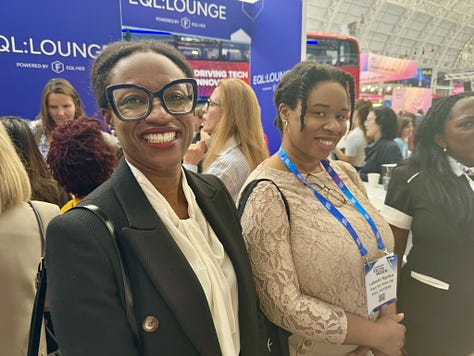
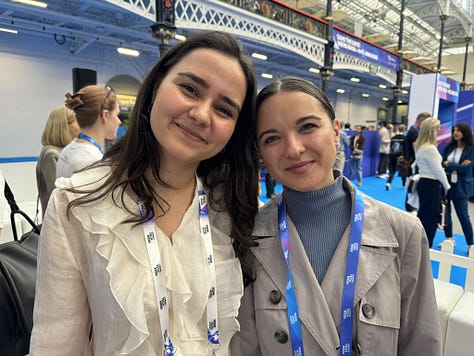
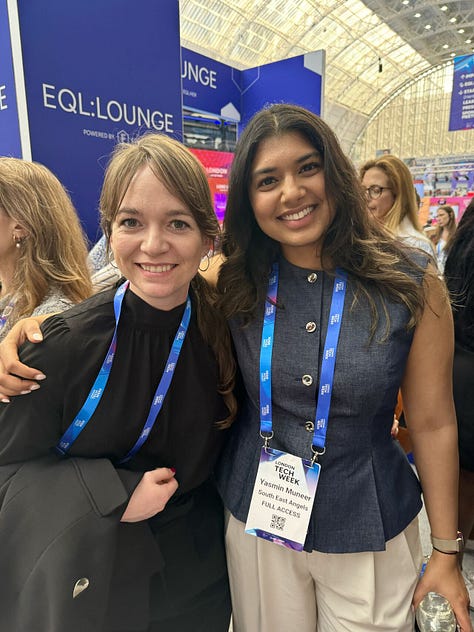
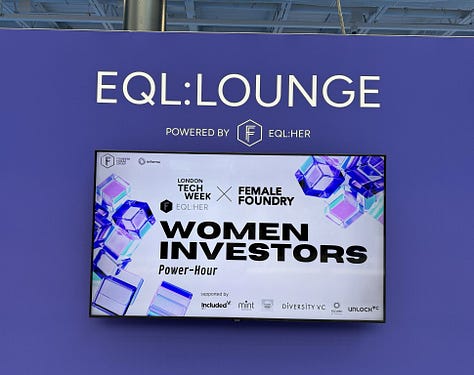

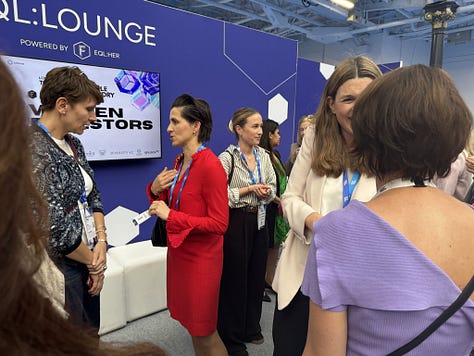
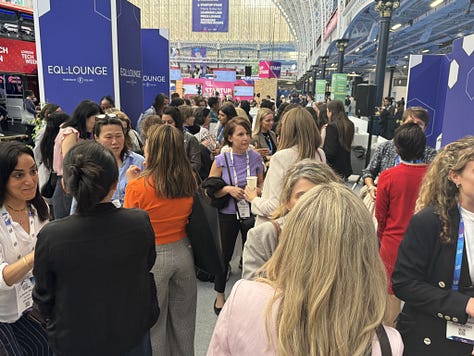
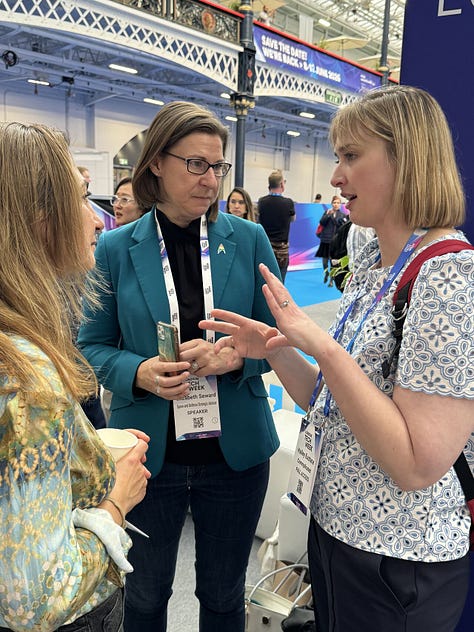
No panels, no scripts, only connecting! It was fantastic to catchup with many of you and take a quick pause during this crazy but wonderful week.
Hiring
This week hiring:
Abound ➯ Finance Manager | doinstruct ➯ Teamlead Customer Success | HelloBetter ➯ Field Sales Manager | flowww ➯ Key Account Manager Europe.
Events
This week
Monday, June 16, Amsterdam ➯ HLTH Europe 2025 | Tuesday, June 17, Amsterdam ➯ Women in AI Benelux X ML6, Paris ➯ Demo Day Ignaite, Zurich ➯ Future-proof Product Thinking | Friday, June 20, London ➯ Hacking Agents Hackathon London.
Enjoy your Sunday. See you next week!
Agata
Written by Agata Leliwa Nowicka, the Managing Partner of the Visionaries AI Incubator, a startup adviser, a two-time entrepreneur, and a founder of Female Foundry based in London.
Suggestions? Drop me an email.
Check femalefoundry.co for more fundraising tools and investor content. View other Female Foundry articles.




VERY GOOD!